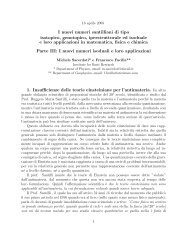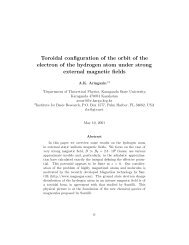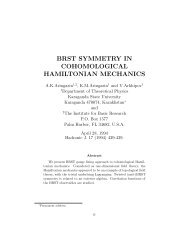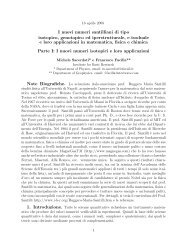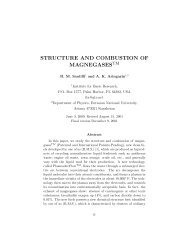the new fuels with magnecular structure - Institute for Basic Research
the new fuels with magnecular structure - Institute for Basic Research
the new fuels with magnecular structure - Institute for Basic Research
You also want an ePaper? Increase the reach of your titles
YUMPU automatically turns print PDFs into web optimized ePapers that Google loves.
THE NEW FUELS WITH MAGNECULAR STRUCTURE 5<br />
warning” or “green house effect.” 4 Of <strong>the</strong>se only 30 millions metric tons are<br />
estimated to be recycled by our ever decreasing <strong>for</strong>ests. This implies <strong>the</strong> release<br />
in our atmosphere of about thirty millions metric tons of unrecycled green house<br />
gases per day, which release is <strong>the</strong> cause of <strong>the</strong> “global warming” now visible to<br />
everybody through climactic episodes such as floods, tornadoes, hurricanes, etc.<br />
of increasing catastrophic nature.<br />
(2) The combustion of fossil <strong>fuels</strong> causes <strong>the</strong> permanent removal from<br />
our atmosphere of about 21 millions metric tons of breathable oxygen<br />
per day, a second, extremely serious environmental problem known<br />
as “oxygen depletion.” 5 Even though not disclosed by political circles and<br />
<strong>new</strong>smedia, <strong>the</strong> very admission of an “excess” CO 2 in our atmosphere (that is,<br />
CO 2 no longer recycled by plants) is an admission of oxygen depletion because<br />
<strong>the</strong> “O 2 in <strong>the</strong> excess CO 2 ” was originally breathable oxygen. Hence, by recalling<br />
<strong>the</strong> atomic weight of CO 2 and O 2 , we have <strong>the</strong> value 32<br />
44 × 30 × 106 = 21.8 × 10 8<br />
tons of lost oxygen per day.<br />
It appears that, prior <strong>the</strong> introduction of oxygen depletion by <strong>the</strong> author in<br />
2000, everybody ignored <strong>the</strong> fact that <strong>the</strong> combustion of fossil <strong>fuels</strong> requires atmospheric<br />
oxygen. Since only <strong>the</strong> global warming is generally considered, it appears<br />
that <strong>new</strong>smedia, governments and industries alike ignored <strong>the</strong> fact that we need<br />
oxygen to breath. Only more recently, various environmental groups, unions and<br />
o<strong>the</strong>r concerned groups are becoming aware that <strong>the</strong> increasing heart problems in<br />
densely populated area are indeed due to local oxygen depletion caused by excessive<br />
fossil fuel combustion.<br />
(3) The combustion of fossil <strong>fuels</strong> releases in our atmosphere about<br />
fifteen millions metric tons of carcinogenic and toxic substances per<br />
day. This third, equally serious environmental problems is euphemistically referred<br />
to by <strong>the</strong> <strong>new</strong>smedia as “atmospheric pollution”, while in reality it refers<br />
to <strong>the</strong> primary source of <strong>the</strong> widespread increase of cancer in our societies. For<br />
instance, it has been established by various medical studies (generally suppressed<br />
by supporters of <strong>the</strong> oil cartel) that unless of genetic origin, breast cancer is due<br />
to <strong>the</strong> inhaling of carcinogenic substances in fossil <strong>fuels</strong> exhaust. These studies<br />
4 The value of 60 million tons of CO 2 per day is easily obtained from <strong>the</strong> chemical reaction<br />
in <strong>the</strong> combustion of <strong>the</strong> indicated daily volume of fossil <strong>fuels</strong> (see <strong>for</strong> details<br />
http://www.magnegas.com/technology/part6.htm.<br />
5 The “oxygen depletion” was first introduced by <strong>the</strong> author at <strong>the</strong> 2000 Hydrogen World Conference<br />
held in Munich, Germany (see <strong>the</strong> web site http://www.magnegas.com/technology/part6.htm).






